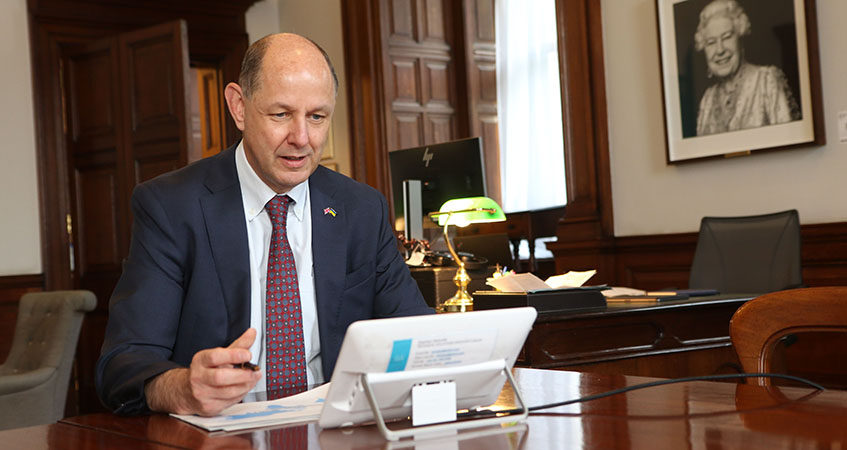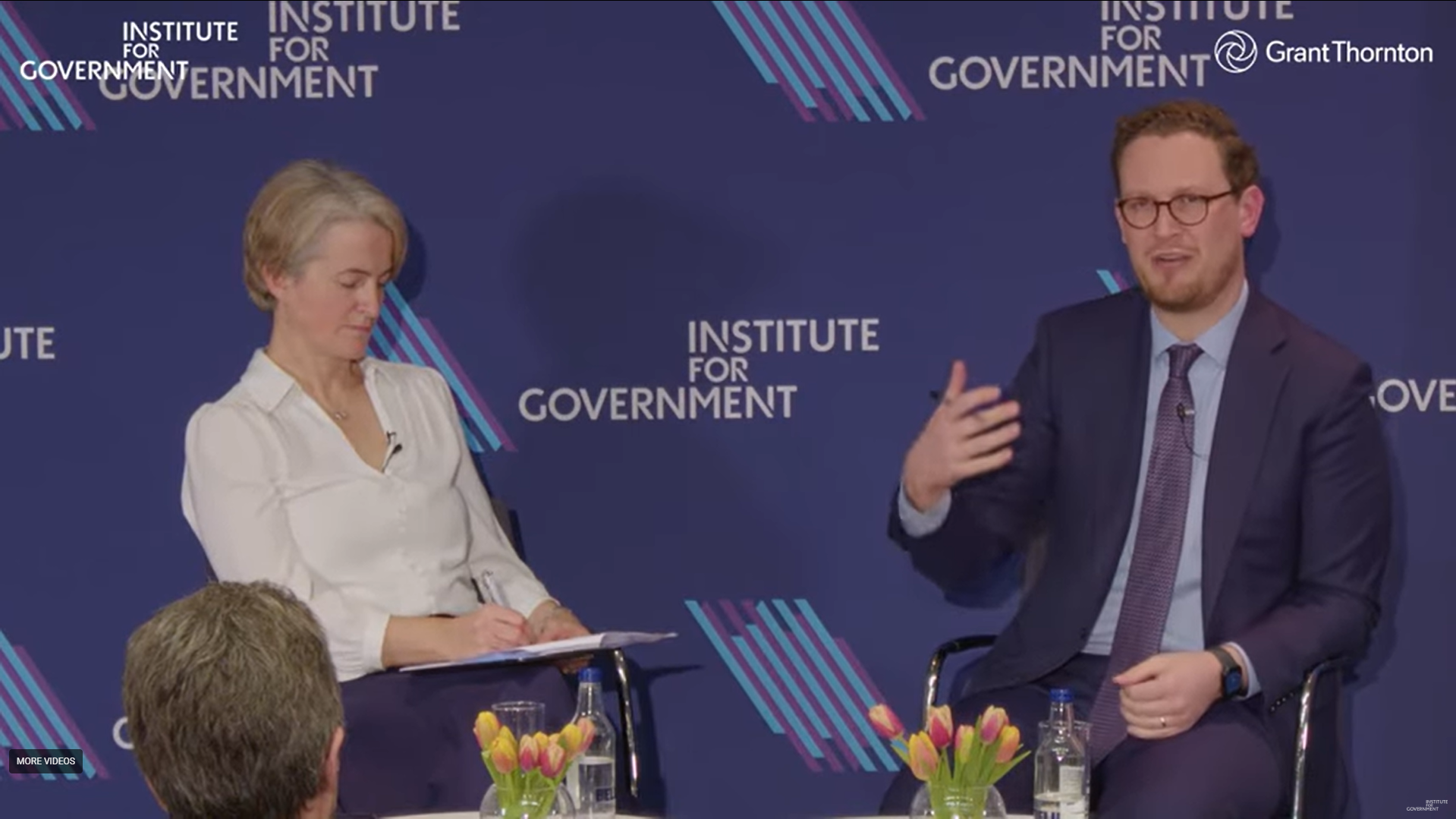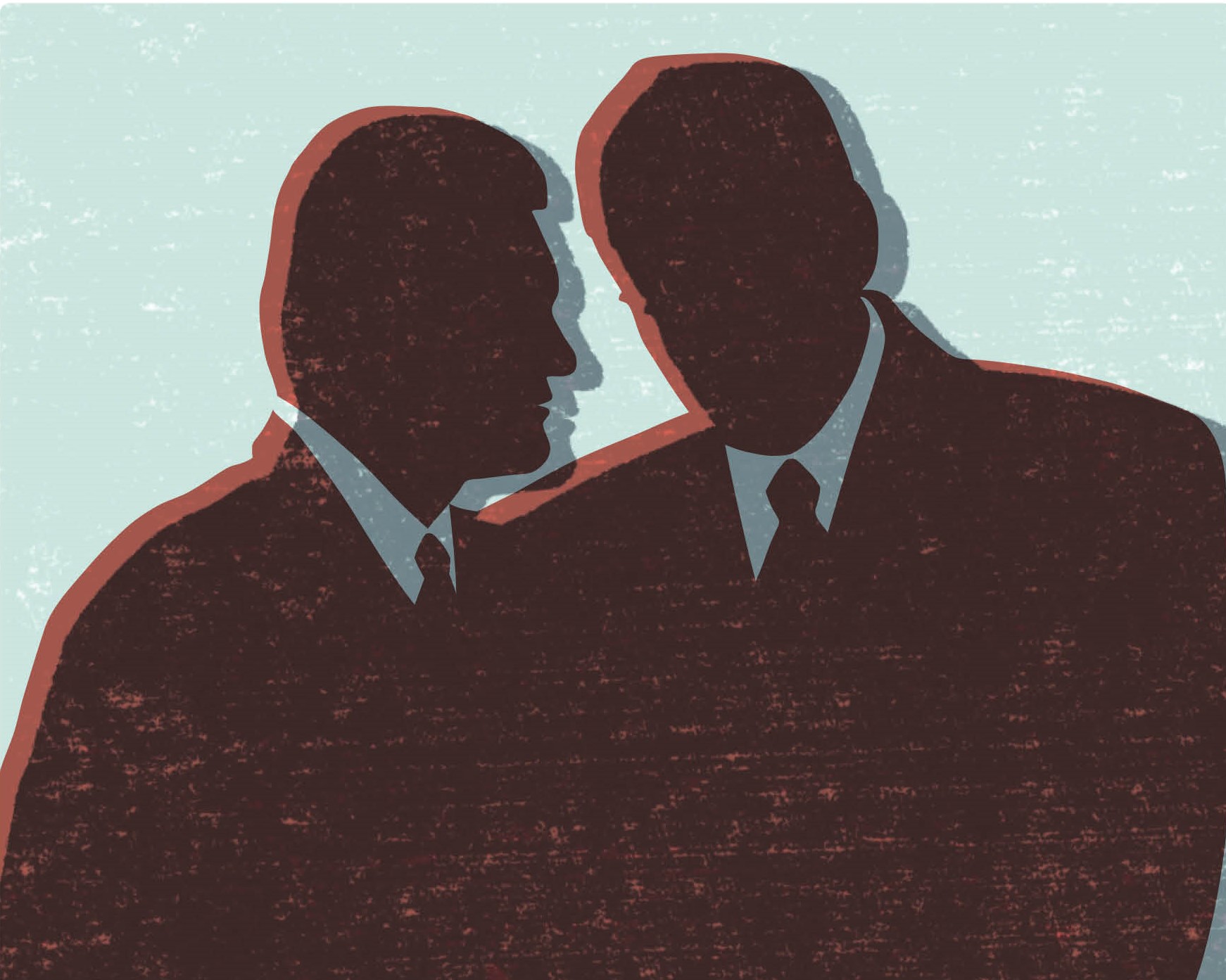“Collaboration is the name of the game”

“I think the UK has led the way internationally.”
Speaking of the ongoing conflict, Sir Philip describes four areas that have been “of particular focus” for the department.
“Firstly is the work around sanctions and we’ve both coordinated across HMG [Her Majesty’s Government] but also coordinated with our international partners through the G7,” he says. “Then there’s our support to Ukraine and Ukrainians. Some of that’s in support of the Ministry of Defence on the military side, some of it is the work we’ve done leading the way on humanitarian support, where we’ve very much built on our development expertise that’s come into the department from DfID (he former Department for International Development, now a part of FCDO) but also using our diplomatic influence.”
The third area he highlights is the “wider political support to Ukraine”, which has involved making sure that “around the world others say what they think about Russia’s actions”, which makes Russia more “isolated internationally”.
“Finally,” he continues. “Very importantly, because this impacts very much on people, is the work we’re doing with partners to hold Russian armed forces and Russians to account for atrocities we’ve started to see, terribly, in Ukraine itself. And again, working in partnership with the Ministry of Justice and others and international partners in Ukraine.”
“A slightly different career”
Sir Philip initially joined what was then the Foreign and Commonwealth Office fresh from completing his Masters in Economics, and has been a career civil servant ever since. While not wanting to follow his father’s footsteps into the British Army, he had a taste for living in other countries from his upbringing and his father’s experiences, which initially sparked his interest in a career with the Foreign Office.
“I’ve not regretted it at all,” he reflects. “I think I’ve been incredibly lucky. I’ve had overseas jobs in countries ranging from Venezuela to India, Pakistan, Cyprus, Gibraltar and Washington DC. So I’ve had really interesting and very varied jobs at different levels overseas and what I’ve enjoyed about them is getting to know those countries in a really detailed way but then using that understanding to pursue our profession, which is the pursuit of British interests overseas and helping Brits when they need our help.”
This extensive overseas experience seems like a natural fit for Sir Philip’s role as Permanent Under-Secretary, however, he suggests that here in the UK he has “had a slightly different career” compared to some of his predecessors. “I spent quite a lot of time in the centre of government, still working on international issues but not in the FCO, as was. I was in No. 10 as a private secretary, I’ve had three or four stints in the Cabinet Office in different roles.”
Sir Philip believes that his varied experience at home and abroad has influenced his approach to his current role. “I was lucky enough to work for John Major and then Tony Blair, so two Prime Ministers from different political parties. It really gives you a detailed understanding of how the heart of the UK government works. It’s fast-paced and you deal with a broad range of issues and that’s always stood me in good stead. Beyond that, I think I’ve learned different things at different stages of my career. When I look at my role as Deputy Ambassador in Washington, our Embassy in the United States has got a lot of different government departments, so I learnt there the importance of working with other departments in the overseas effort and how you make that a coherent whole, which I took into my roles in Pakistan and now my present job.”
Merging diplomacy and development
Taking the reins of the newly-formed FCDO in September 2020, Sir Philip was tasked with overseeing the merger of two distinct departments in the Department for International Development and the Foreign and Commonwealth Office.
“The Prime Minister’s intent was clear,” Sir Philip explains. “He wanted us to achieve more internationally by being more coherent in our work and, although it was announced beforehand, it was very much a theme of the integrated review the government carried out of our foreign defence, development and international security policies.”
The two departments have now merged with “a new, unified structure” and Sir Philip says the department is “putting in place the key building blocks, so we have single budgets, single plans for each country under the leadership of the Ambassador or the High Commissioner”. He believes that the new department is now “achieving more”, listing off a string of successes, from the “UK’s international leadership at the G7”, including “announcements around the global health effort”, to raising money to improve education, with “$5 billion pledged to educate women and girls in the summit we convened with the President of Kenya”, to the UK’s COP26 presidency. “What we were able to achieve leading the world on the climate side was very much both our diplomacy but also our development effort coming together,” he adds.
“So, it’s work in progress in terms of it’s a long-term endeavor building a new department and there’s some things we’re still working through, like making sure we’ve got a unified IT system, making sure that we step-by-step unify our terms and condition, but we are definitely making progress.”
Last year, the FDA’s Agenda for International Development, put together by FDA intern Dev Bahra, raised concerns from civil servants that the new department “was not sufficiently prioritising development” (see box). Sir Philip is familiar with the report and the concerns it raised but assures that the department has “done a reasonable job at retaining our development expertise”.
Ahead of the merger, the government looked at the experience of Australia and Canada, “who’d done similar mergers in the past”, because, according to Sir Philip, “we wanted to learn the lessons” – one of them being “the risk around losing development expertise”. He “put quite a lot of time and energy into making sure that, at senior levels, the key leaders we had stayed in the department” and Sir Philip says that if you look at overall turnover rates “they’re about the same as they were before and they’re about the same whether it’s for legacy DfID or legacy Foreign Office people”.
“I think the fact that the government’s just published its international development strategy sets out a vision for how government – and how the UK’s – going to be doing development work going forwards,” he adds. “We’ve just had a refresh of our senior structure and we’ve created a new DG [Director General] role, which will have the explicit title of DG Humanitarian and Development, which again I think at board level will give us clear leadership of the development agenda which I think will help a lot and address some of the things that Dev heard last year.”
Lessons from COVID
Of course, when Sir Philip started in his current role, the UK government and, indeed, the whole world, was dealing with a global health crisis. The FCDO was two separate departments at the start of the pandemic, so while adapting to the merger staff also had to adapt the new challenges posed by COVID-19.
“I think we have learnt from COVID that actually, international collaboration is absolutely fundamental, and we’ve learnt from the risks of variants emerging in other countries, how they can quickly spread around the world,” he says. “You genuinely can’t close your borders and so collaboration is definitely the name of the game. I think we’ve definitely built some important new capabilities and partnerships, obviously the WHO [World Health Organisation] as the global health organising body is a key part of that and we’ll carry on our support to them, including as they reform and improve for the future but also our collaborations around vaccines, the leadership we showed through our G7 presidency to make sure that vaccines were being made available around the whole world.”
Sir Philip also hails the partnership between AstraZeneca and Oxford University, which was “a UK vaccine” and “a key part of making sure the majority of the world could be vaccinated”.
Not only did the pandemic have an impact on the work of the department, it also had an impact on the way the department worked. Like with many employers, COVID restrictions meant that the FCDO and its predecessor departments had to adopt more remote working, with the added complication of managing an international workforce.
“The impact on people was really significant,” Sir Philip says. “For UK colleagues around the world, [it was] really challenging because their ability to come and go, to reconnect with their lives in the United Kingdom or sometimes in other parts of the world was suddenly brought to a halt.”
He also explains that a significant proportion of “country-based colleagues” are also “recruited locally”. This means that in “quite a lot of places” it’s difficult for them to work from home as “there may not be the kind of infrastructure that we’re lucky enough to have here in the UK”.
Against this backdrop, Sir Philip is “genuinely proud” of the department’s “ability to carry on delivering”. With different parts of the FCDO’s global network going through different waves of the pandemic at different times, the department “had to learn to work in a more agile way”. As some staff still came into the office every day because of the nature of their job, Sir Philip says “there’s definitely not one size fits all” but he hopes to “learn from some of the really good practices and some of the things we’ve done during the pandemic”.
With a global workforce and two UK headquarters – Abercrombie House in East Kilbride and King Charles Street in London – the FCDO already has split teams “who do a fair amount of their work in a hybrid way”. However, Sir Philip says the department is now seeing “a steady increase in the number of people here in the UK choosing to come and do their work from our offices”.
“Working using [Microsoft] Teams, working using calls to talk to one another was already commonplace, I think it’s become even more commonplace, but I do think we missed what you can gain from being together in one place,” he suggests. ”Whether that’s teamworking, whether it’s people who are newer to the organisation who are learning by interacting with others informally and various other things. I do think over time, as we have more people working in our buildings both here in the UK and around the world, it will help us and I actually think that’s what people want. They like the social aspect of being in the office together with colleagues and others.”
Shortly before our interview, the government announced its plans to cut 91,000 civil service jobs. This is potentially up in the air while the Conservative Party conducts a leadership contest to elect the UK’s new Prime Minister but many of the candidates support the policy. While the details are still unclear, Sir Philip explains that senior leaders in the civil service, led by the Cabinet Secretary Simon Case, have started “working through” what those cuts would mean in reality. In terms of what it could mean for the FCDO, Sir Philip is quite clear on his position: “The Foreign Secretary and I are determined that we should make sure we have the people we need to deliver the government’s international agenda.”
Tommy Newell is Communications Officer at the FDA
Related News
-

Penman challenges senior political figures on civil service reform at Institute for Government conference
During the Institute for Government’s annual conference, FDA General Secretary Dave Penman questioned speakers Chief Secretary to the Prime Minister and Chancellor of the Duchy of Lancaster Darren Jones MP, Secretary for Health and Social Care Wes Streeting MP, and Shadow Chancellor Sir Mel Stride MP on key issues relating to civil service reform.
-

Why anonymous attacks must stop: Dave Penman on the “damage” caused by briefings
FDA General Secretary Dave Penman on the untold damage done by anonymous briefings against the civil service, and why this pattern needs to change.
-

Member focus: mentee into mentor
Member Sabrina Schalz applied for the Fast Stream (FS) whilst pregnant, and took her baby with her to the FS Base Camp. Katherine Hutchinson finds out more about the support Schalz received when navigating the FS application and her decision to become a mentor herself.